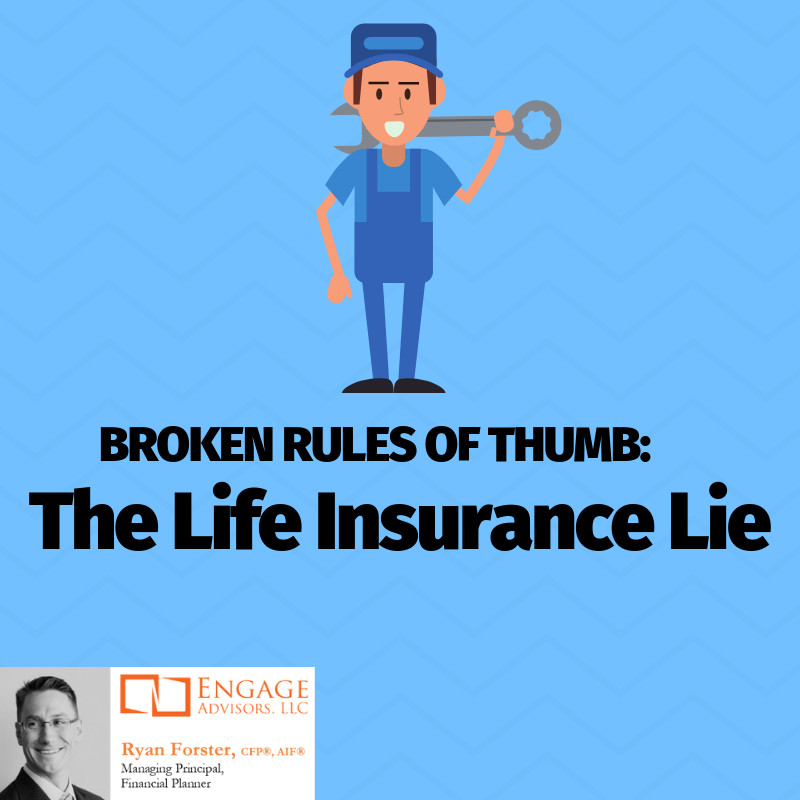“A son can bear with equanimity the loss of his father, but the loss of his inheritance may drive him to despair.” – Niccolo Machiavelli
Broken rule of thumb: Have at least 5x your income in life insurance. I’ve seen this rule of thumb vary significantly. One company lists 5-7x your annual income, another states life insurance needs to be at least 7-10x. Recently I even heard the rule is to have 500k per family member plus debt – which makes very little sense. While having a minimum amount of life insurance may seem like sound advice, it’s not that easy. The proper rule of thumb for life insurance should be: it depends. I will highlight three major contributors to life insurance need. There are of course countless more to consider.
Worth more dead than alive – debt usually haunts our survivors when we die. While the value of the debt often declines over time, burdening your loved ones with money owed can be salt in the wound of a grievous loss. This very basic coverage presents a clear and definable insurance need.
Where does this go wrong with debt? Say you have 50k in credit card debt, 75k in auto loans and 500k left on your mortgage in a 20-year note. Debt alone, purchasing 625k coverage with a 20-year term insurance policy makes sense. If your debt is higher than 5x your income, this rule wouldn’t fill the hole. And that’s just for starters.
Filling the fridge – Income replacement is where the rule of thumb goes the most wrong. Why 5-10x our income? Perhaps insurance agents push it so they can sell bigger policies. Perhaps financial advisors do it so they don’t have to think about anything but their investments. Or perhaps it’s just easier to be arbitrary…
Let’s apply some math. Assume $250k income, your spouse doesn’t work and you have 2.5 kids. At 10x income, that’s $2,500,000 in life insurance. Sounds like a lot at first. However, you may fall woefully short protecting your precious standard of living. $2.5 million may afford somewhere around 100k per year using the 4% rule. Now let’s consider your non-working spouse. To replace that income, there’s no number to multiply. Some would say then there’s no insurable need. Digging deeper, will you be able to support the family without your non-working spouse? Replacing that value is much more difficult than a simple multiplier and is vastly different person to person.
The kids need to be smarter – One of many financial needs parents worry about is putting the kids through college. Two considerations. First, college costs are inflating very quickly, according to finaid.org, education is inflating at 8% per year. Second is how much you are saving to put them through college.
At current college inflation rates, an in-state college that costs $25k per year now will cost $100k per year in 18 years. That’s nearly $400k to put one kid through college. Saving ahead is your best option, first because 100k per year is a ton to spend out of pocket, second because life insurance for college planning means you must die to pay for it. We believe whole life as a savings tool for college is a poor decision, so we won’t go there. As you save more for your children’s college, the need for insurance goes down. If you don’t save, the need goes up. If you die, without covering the gap in college costs with life insurance, chances are the kids will be on their own.
Moral of the story: Life insurance should be part of your financial plan and shouldn’t be chosen with arbitrary rules. The answer to how much you should buy should be custom tailored to you and adjusted as your life changes. This insurance is a very important protection for those who need it. It’s a pointless expense for those who don’t.
If you want to learn more about building life insurance as part of your financial plan or any other concepts in this blog, please call Ryan Forster at 913.681.9155 or email ryan@engageadvisors.com.
Engage Advisors, LLC is a Registered Investment Adviser. This platform is solely for informational purposes. Advisory services are only offered to clients or prospective clients where Engage Advisors, LLC and its representatives are properly licensed or exempt from licensure. Past performance is no guarantee of future returns. Investing involves risk and possible loss of principal capital. No advice may be rendered by Engage Advisors, LLC unless a client service agreement is in place.

